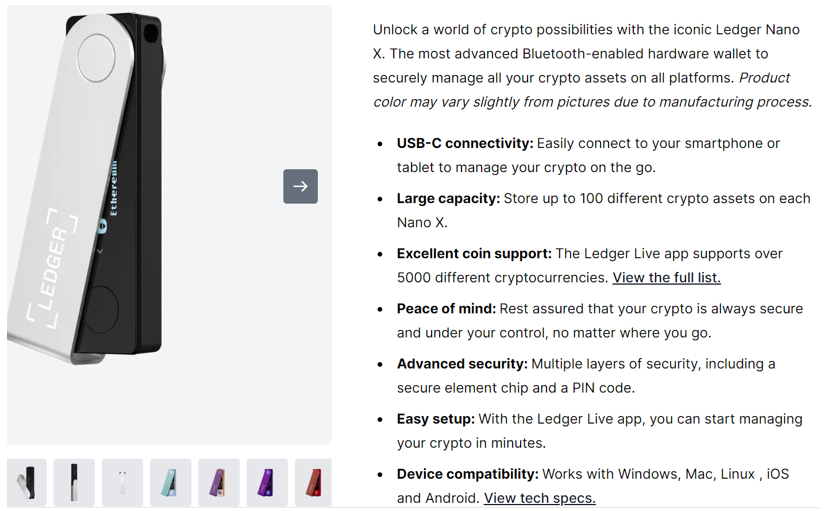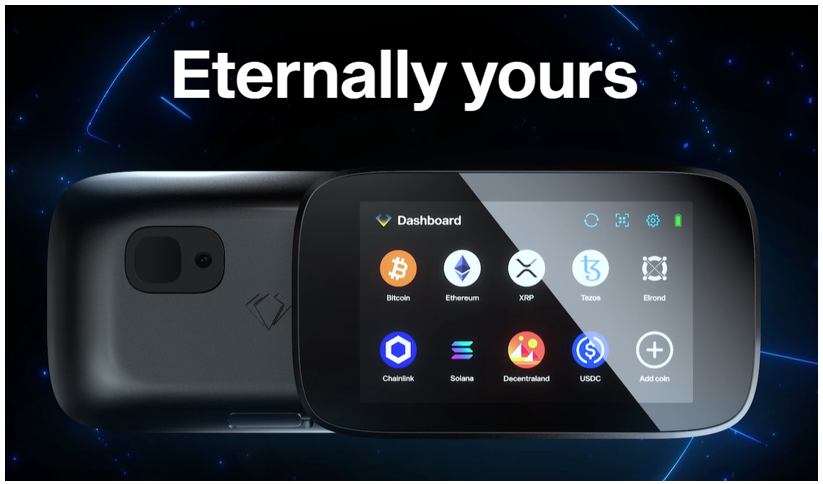 |
| By Beth Canova |
Yesterday, I walked you through the process of setting up a software wallet. That is the first step to truly entering the crypto world as it guarantees that you — and only you — are in total control of your crypto and your financial destiny.
Soft wallets are also instrumental in navigating the world of decentralized finance. We’ll dive deeper into that tomorrow.
But soft wallets do have a few drawbacks. Namely, they are still connected to the internet and are still susceptible to bad actors.
While soft wallet developers work hard to ensure their wallets are secure, hackers can still in theory target weaknesses in the code to wreak havoc.
Remember the recent hack we wrote to you about? That code, sent to all decentralized apps, targeted the connection between the decentralized app and users’ soft wallets to hijack their transactions.
Fortunately, the damage was contained, and a solution was sent out quickly. But that’s just one example of how your wallet can be targeted.
Therefore, the only way to be 100% sure your crypto is completely secure is by using hard storage. This means having your keys stored somewhere that’s not connected to the internet.
In the old days, hard storage meant writing down your private keys on a piece of paper and making sure the paper itself stayed safe and dry.
And although that’s still a viable option, you’re now far better off using a hardware (or hard) wallet, which is also known as a cold wallet.
As the name suggests, hard wallets are physical devices that can be used to store your crypto keys offline. They typically look like small USB drives.
In our opinion, hard wallets are the safest way to store your crypto.
But that doesn’t mean they’re perfect either. Hard wallets can be expensive, costing anywhere from $50 to $400. They are also less convenient to use than soft wallets. That makes them unpopular with short-term traders who need to act quickly.
Still, for investors who plan on holding for a while — affectionately called HODLing in crypto — the cost and minor inconvenience are small prices to pay for the additional security and stability.
There are a few options for hard wallets available, so below are three of the most popular options:
This top-of-the-line hardware wallet is one of the more expensive options, retailing for $280 at the time of writing. But it supports over 1,000 crypto assets, which is impressive.

Even more so is its dedication to security. Trezor has been audited by third-party security researchers and boasts a long-standing successful track record. Since its initial release, there have been no known instances of successful remote hacks resulting in loss of user funds to date.
As such, Trezor is widely considered the safest crypto wallet on the market.
The Trezor Model T wallet can also be integrated with some soft wallets, combining the security of the former with the convenience of the latter.
Based in France, Ledger is considered the standard is the hard-wallet market. It has a few options, including the good-for-beginners Ledger Nano S (for $80) and the more sophisticated Ledger Nano X (for $150).
The Nano X has Bluetooth capabilities to allow for cordless connection to your laptop, supports over 5,500 different cryptocurrencies and features a CC EAL5+ Certified secure element chip.

Both devices can run on most major operating systems and can utilize the Ledger Live software. This allows users to manage their coins on desktop or mobile for on-the-go transactions while keeping your private keys offline. Since your keys can’t be accessed from your computer or mobile, this method is more secure than simply using a mobile wallet.
And, like Trezor, both Ledger Nanos also support integration with web3 wallets such as MetaMask, allowing users to access various DeFi platforms.
I should note here that there is some controversy around Ledger. Earlier this year, the Ledger team proposed an ID-based key recovery service that would back up users' seed phrases and require users to provide a passport or national identity card for identity confirmation if they needed to retrieve their backed-up seed phrase.
That requirement to forgo anonymity and for Ledger to suggest keeping seed phrases in a centralized place on the internet was a huge point of contention for many crypto enthusiasts. Especially in light of a data leak in 2020. Ledger did eventually walk this suggestion back, but for many, even the suggestion was enough to make them think Ledger wasn’t taking security seriously.
If you’re looking to HODL long term and are looking for maximum security, then you may want to consider newcomer NGrave Zero.

It is 100% disconnected from the internet, unlike the other two hard wallets I’ve covered. It has the highest security certification standard possible — higher than Ledger’s — and has the same third-party security certifications as Trezor.
Basically, NGrave Zero reaches a higher standard of security than any of its competition.
The device itself also has a light sensor, biometric scanners, pin protection and is tamperproof for maximum security.
And it is user friendly, with a large screen and simple navigation — something that has been a sticking point with other hard wallets as user interfaces were not easy to navigate.
The downside to all this security is that NGrave Zero doesn’t have web3 integration that would allow it to interact with a soft wallet. This means if you want to use your crypto, you’d have to move it out of your hard wallet entirely.
It is also the most expensive of our top three wallets, coming in at $400.
Final Considerations
While the simplest and most convenient way to hold crypto is on a centralized exchange, it’s simply not as safe as you may think. While 2022 may feel like forever ago, investors who trusted the various centralized exchanges that collapsed or experienced hacks that year surely haven’t forgotten.
And we don’t want you to be in that position. Ever.
A centralized exchange may be a perfectly fine route to take if you have a relatively small portfolio of cryptos, particularly if you plan on trading them frequently or are a day trader.
But if you’re willing to put in a bit more legwork — or sacrifice a tiny bit of convenience — it would be far more secure to use your own soft wallet.
Meanwhile, for crypto you plan on holding for a long time or crypto you have in large amounts, there’s simply no substitute for a hard wallet. After all, if you’re holding a lot of crypto assets, you definitely want to make sure they receive the best protection possible.
It’s up to you to decide if the more complicated process of a hard wallet is worth it for you and if so, which wallet best suits your needs. Yes, it’s more secure, but if you’re constantly trading or investing only small amounts, it may not be worth the effort for the added security.
Here’s a tip from your Weiss Crypto experts: A solid approach in our opinion is to use a combination of different wallets. That way you can tailor each one to a particular asset, purpose or intended holding time.
It’s incredibly easy to use a soft wallet in combination with a hard wallet — especially ones that feature web3 integration — for the best of both worlds.
Either way, you’re keeping your crypto safely out of the hands of centralized platforms and away from bad actors.
Best,
Beth Canova
Crypto Managing Editor

